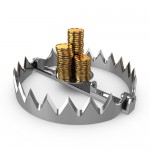
Americans in February were less concerned, though still pessimistic, about their current financial situation than they were at the end of the government shutdown last October, according to the Finance Optimism Index launched April 1, by the Consumer Bankers Association (CBA) and AOL Inc.
The two companies calculate the index as the percentage of respondents who are optimistic minus the percentage of respondents who are pessimistic. Index values above zero indicate more respondents felt optimistic than pessimistic, and Index values below zero indicate more respondents felt pessimistic than optimistic.
Survey questions each month are asked to a random national sample of approximately 1,600 U.S. online adults ages 18 and older in the AOL/Ipsos MediaCT Brand Tracking Survey. The index tracks optimism through agreement with four statements in a survey: I am optimistic about my personal financial future; I am worried about my current financial situation; The news I’ve been hearing in the past few weeks about Americans’ personal finances has been generally positive; and I am worried that the current economic and political situation is going to affect my personal finances.
Last October, the research found, Americans’ level of financial optimism was low, with the Index at minus 24. The news about the government shutdown was negative, and Americans were worried about how the current political and economic situation would affect their personal finances, the companies said in the index announcement.
In November, the Index increased by 16 points to minus 8. News became more positive, and Americans were less worried about how the current economic and political situation would affect their personal finances. The Index remained steady the next month.
Attitudes took a positive turn in January, when the Index reached plus 4. Americans seeing more positive news about personal finances drove that increase. The results also could mark the impact of rising stock prices and a decline in the unemployment rate, CBA and AOL said in the index announcement.
However, by February, the Index dipped again below zero to minus 2.6, possibly because of a slow start to the month in the stock market and rising prices for gasoline, the companies said.